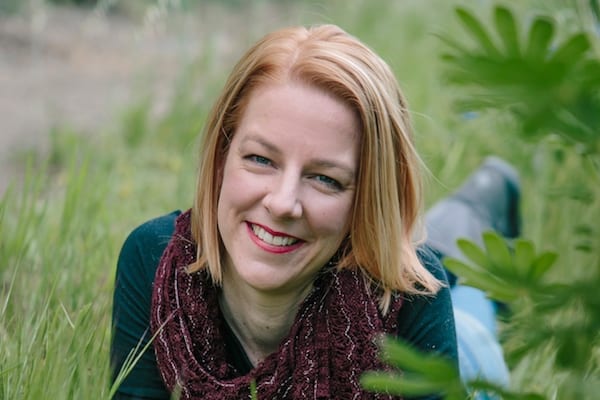
Although she has been writing her whole life (her first stories were stapled-together strips of typewritten text), Kim Lock spent the first decade of her adult life working around Australia as a graphic designer.
In her thirties, after having her second child, she finally gave writing a serious shot.
After her first novel was published to acclaim with independent Adelaide press MidnightSun Publishing, Kim’s second novel was selected to participate in the QWC/Hachette Australia Manuscript Development Program in 2013. This novel was then snapped up by Pan Macmillan Australia and will be published with the title LIKE I CAN LOVE in March, with international rights already sold to Germany and the UK.
As a qualified volunteer breastfeeding counsellor and activist for women’s rights in pregnancy, childbirth and motherhood, Kim’s popular op-eds have appeared in The Guardian, Daily Life, and The Sydney Morning Herald online amongst others.
Growing up, what kind of career did you want to pursue?
In primary school I wanted to be a doctor. The idea of both healing and authority was the appeal there, I think. In my horse-loving teens this morphed into a desire to go into veterinary medicine instead. By late teens, now very disinterested in study, I’d abandoned the medical idea altogether and was offered a job as a casual typesetter at a local magazine. Here I discovered not only did I love graphic design, but that I was good at it. Over-arching all of this, all the time, was writing.
Who inspires you?
Women who love and believe in themselves – and the people who love and believe in women.
And writers who can speak in public.
How have women helped shape your success to date?
I have a handful of the most amazing women friends who have cheered me every moment. These women are intensely smart, courageous, and hilarious. They remind me of my own strengths whenever my energy is flagging – sometimes with cake, and oftentimes with swear words. All women need sister-friends like these.
More broadly, every day I am inspired by many stirring, joint-destroying feminists out there, thwacking a space through the tangle of testosterone with their fabulous machetes and I think to myself, Yes! What she said!
What qualities do you most admire in a female colleague?
Interestingly, I initially went to answer this question by thinking back to the days when I worked in an office. What came up for me was a sense of powerlessness – that I couldn’t choose my colleagues, so it was a matter of trying to find the best qualities in everyone for my own safety. However, I am now at the stage where I have the luxury of choosing my colleagues, or at least choosing the level of my interaction with them. My colleagues are my fellow activists and writers around the country and the world, my publishers and editors. The qualities I admire in these people are qualities they all hold: kindness, empathy, articulateness, integrity, and a cracking sense of humour. Most importantly, women working together need to be each others’ leg-up as they climb, reaching out to haul each other up along the way.
What’s the key to balancing work and life?
If I may answer your question with another question: Does such a key exist? And if so, why are women often expected to find it? I believe life balance comes not through the ability to avoid stumbling, but through the ability to carry on despite imbalance. Every women has to find her own way to nullify the difficulties imposed upon her by a society that values money and white men above all else. And no matter how she does it, a woman finding her way – any way – is brilliant.
If you had an afternoon to yourself, how would you spend it?
Binge-watching The Good Wife with a large packet of potato chips.
Who do you regard as your mentor?
My agent, publishers and editors. They have all the answers!
What personal attributes have you used to overcome adversity in your life?
Open-mindedness, I think, and a willingness to learn something new. Going with my gut instinct, even if it often takes me in a different direction to everyone else!
If you could make one change to women’s lives, what would it be and why?
To remove women’s learned fear of their own bodies, in particular surrounding reproduction. For centuries women have been sold the lie that their body is inherently frail and flawed. Women’s bodily power – in sexuality, reproductive control, pregnancy, childbirth and lactation – has been squashed through religious dogma, legislative restriction, and machinations for profit. When women shake off these lies and find their own power – whatever that power may entail for each unique woman – they are glorious, and unstoppable, and the world heals a little.
What is the hardest part of your job?
In my job as an activist and opinion writer: Dealing with people’s cognitive dissonance. In my job as a parent: Making sixty-five meals and eighty-seven snacks a day. In my job as a novelist: Finding the time. Writing and revising a novel is a long process – Like I Can Love took four years from first draft to publication – and between small children and my freelance work, I lust after the idea of having more time to devote to writing fiction.
What advice would you give to someone aspiring to success in your field?
Be a reader first and always. I adore the quote by Pam Allyn: Reading is breathing in, and writing is breathing out. And practice, patience, and perseverance.
Like I Can Love by Kim Lock is out now with Pan Macmillan, RRP $34.99.


